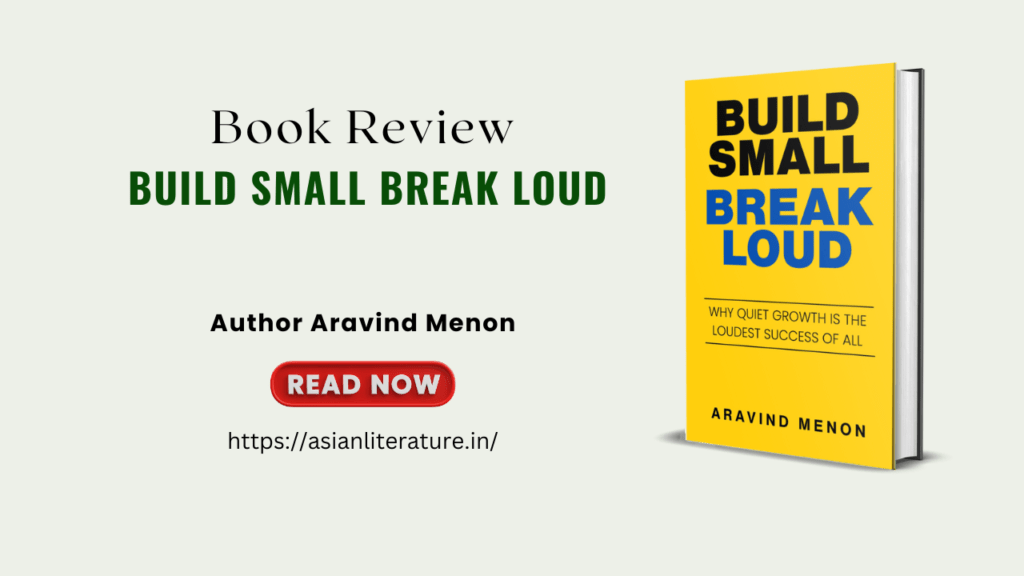
Build Small Break Loud
In Build Small, Break Loud, Aravind Menon delivers an honest, unvarnished exploration of entrepreneurship that feels like a warm conversation rather than a how-to sermon. This is not another book promising to make you rich with 10x frameworks and viral growth hacks. Instead, it is a deeply personal manifesto for founders who value clarity, authenticity, and meaningful impact over flashy vanity metrics.
From the outset, Menon establishes his voice as that of a practitioner rather than a theorist. He shares his journey of multiple failures, invisible startups, and quiet pivots before finding his groove with Sociium – a digital marketing company dedicated to helping founders build brands rooted in purpose rather than noise. Each chapter is layered with his lived truths, offering readers insights that feel grounded in India’s real startup ecosystem, where dreams are often bigger than bank balances.
The book is structured into thematic essays and reflections, interspersed with founder stories from his podcast, The Business Couch Show. This structure ensures that the reader is not just learning from Menon’s introspections but also from the diverse experiences of other Indian founders navigating industries from health tech to creative studios and real estate branding.
What stands out is Menon’s brutal honesty about failure. In the chapter The Startup You’ll Never Hear About, he describes the silent phase of building something that no one sees, where the work feels real but the results do not exist yet. He calls it “the Phantom Phase” – a place of invisible becoming that every founder experiences but few discuss publicly. His writing here is deeply empathetic, as he reassures struggling builders that obscurity is not a curse but a gift that allows for mistakes, learning, and authentic growth without the burden of public performance.
Another powerful reflection is in Why It’s Okay to Suck at First, where he debunks the toxic myth of perfection in entrepreneurship. He writes, “You don’t get to skip sucking. You only get to decide how loud the shame is while you suck.” Such lines pierce the illusions of hustle culture, reminding readers that confidence is earned through consistency, not inherited through credentials.
Throughout the book, Menon critiques startup vanity culture – where founders build for investors and LinkedIn claps rather than customers and real value. His chapter Chasing Validation vs. Chasing Value narrates his own downfall in a venture where he focused on pitch decks and buzzwords instead of paying users, resulting in an elegant failure. This cautionary tale is a reminder for Indian founders tempted by the glamour of funding announcements without clarity of problem-solving.
What makes Build Small, Break Loud refreshing is Menon’s practical wisdom rooted in humility. He does not shy away from admitting his weaknesses, particularly in finance and pricing, and explains how delegating these areas helped him focus on his strengths in strategy, brand building, and storytelling. This perspective is rare in Indian business writing, which often celebrates all-knowing leaders rather than collaborative builders.
The later chapters on Sociium are especially inspiring. Menon narrates how his company found its niche by helping small startups gain traction rather than chasing big-ticket clients. His idea of “Marketing with Soul” – prioritising clarity over complexity, value over visibility – challenges the default aggressive growth strategies taught in business schools.
Stylistically, the writing is conversational and authentic. Menon speaks directly to the reader as a mentor, friend, and fellow struggler. His prose is unpretentious yet profound, sprinkled with metaphors rooted in Indian entrepreneurial realities – chai meetings, bartered services, Canva designs, and all-night grind sessions. Occasionally, his repeated emphasis on anti-scale philosophy risks becoming idealistic for founders aiming to balance ambition with ethics. However, it remains a necessary voice in today’s noisy, investor-driven ecosystem.
In summary, Build Small, Break Loud is not a startup playbook. It is a spiritual and strategic companion for founders who want to build businesses with meaning, craft brands with authenticity, and redefine success on their own terms. Aravind Menon’s book is a must-read for Indian entrepreneurs tired of shallow “unicorn” worship and seeking quiet, durable growth that nourishes both brand and builder.
Title: Build Small Break Loud
Author: Aravind Menon
Publisher: Evincepub Publishing

